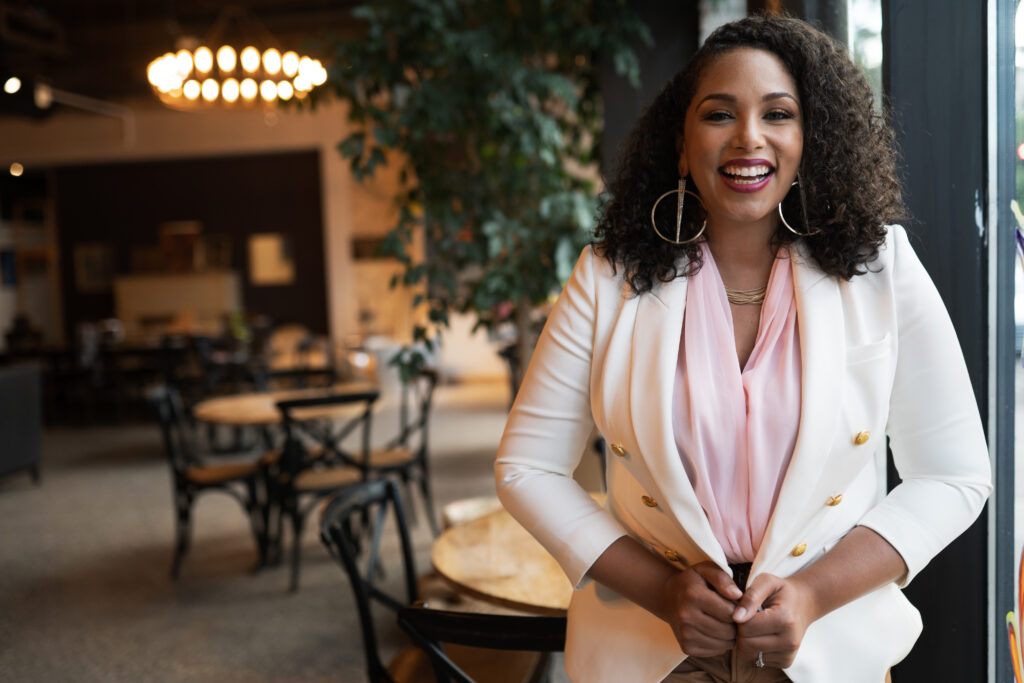
Georgia Fort is fighting racial injustice and patriarchy with the most powerful weapon—her lens. Independent journalist and Founder of BLCK Press, Georgia uses her camera to expose injustice on all fronts. Currently covering the Derek Chauvin trial in Minneapolis, she believes that media outlets should be responsible and report stories that demand accountability from the perpetrators of these horrendous crimes. As an advocate of media reform and narrative justice, the twice Emmy nominated journalist hopes to change the constant negative portrayal of black people and their experience by the media for her children and generations to come.
FWM: Georgia, thank you for taking time out of your busy schedule for this interview. Please introduce yourself to our readers.
GF: My name is Georgia Fort, I am an independent journalist, founder of BLCK Press, wife & mother to three little girls.
FWM: What led you to a career in the media industry?
GF: I love telling stories, I love being in a position to have a positive influence specifically with our youth.
FWM: Your motto is “Changing The Narrative”. In what ways do you feel that American media has failed in the way they portray the Black experience and what can they do to change?
GF: Since the inception of media Black people have been portrayed negatively. Dating all the way back to Black face. Media continues to perpetuate false narratives by airing newscasts saturated with Black mugshots. Media (print, radio and TV) has at large been used as a vehicle to dehumanize Black people and to delegitimize the Black experience. We can go on to examine the lack of representation of writers, producers and on-air talent in every medium of media. The lack of representation in the industry also contributes to why media struggles to portray authentic Black experiences. Lastly, I will say that there have been several studies done on the sourcing that is done throughout newsrooms across the country. 80 percent of the time newsrooms source white men. So, for these reasons and so many more that I could name I have identified the need for media reform and narrative justice. Changing the narrative was birthed out of that need. To intentionally create media that counters the negative narratives about the Black experience and contributes to a new way of amplifying how dynamic and brilliant our community is.
FWM: As a female journalist, what obstacles have you had to overcome to achieve success?
GF: I was legally terminated from my job as a news anchor when I was 9 months pregnant because I was told I was not eligible for maternity leave. We know that this biologically could never happen to a man. As a female journalist who is now independent that derailment played a significant role in why I am not in mainstream media anymore. Media tends to uphold patriarchy and values of white supremacy like so many other American industries.
FWM: If you could interview any person, living or dead, who would it be and why?
GF: Tupac. I think he was a visionary. I think he had a great way appealing to aa specific audience that needed hope and inspiration. Despite being widely criticized for some of his music there was a large portion of his catalog that amplified the experience of Black women in a powerful way.
Additionally, Tupac was a poet. One of my favorite pieces of literature is “The Rose that Grew from Concrete.” I think so many people who came from poverty and drug-ridden homes needed that type of symbolism in order to not become a product of their environment. Including myself.
FWM: What advice would you give young women entering the field of journalism and/or media?
GF: Hard work pays off. Big markets aren’t everything. Find a balance between work & life.
FWM: As a journalist, what message does your work send to the world?
GF: I hope my work spotlights injustices in our community in a way that requires accountability for those people or entities that are committing the injustices.
I also hope my work sends a message that portrays Black excellence.
FWM: How can our readers connect with you outside of this interview?
GF: My website is the central place to reach me: GeorgiaFort.com. Links to all my social platforms can be found there.
Photos courtesy of Georgia Fort


